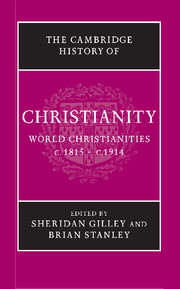Book contents
- Frontmatter
- 1 Introduction
- PART I CHRISTIANITY AND MODERNITY
- 2 The papacy
- 3 Theology and the revolt against the Enlightenment
- 4 The growth of voluntary religion
- 5 Catholic revivalism in worship and devotion
- 6 Women preachers and the new Orders
- 7 Church architecture and religious art
- 8 Musical trends and the western church: a collision of the ‘ancient’ and ‘modern’
- 9 Christianity and literature in English
- 10 Christian social thought
- 11 Christianity and the sciences
- 12 History and the Bible
- 13 Popular religion and irreligion in countryside and town
- PART II THE CHURCHES AND NATIONAL IDENTITIES
- PART III THE EXPANSION OF CHRISTIANITY
- Select General Bibliography
- Chapter Bibliography
- Index
- References
10 - Christian social thought
from PART I - CHRISTIANITY AND MODERNITY
Published online by Cambridge University Press: 28 March 2008
- Frontmatter
- 1 Introduction
- PART I CHRISTIANITY AND MODERNITY
- 2 The papacy
- 3 Theology and the revolt against the Enlightenment
- 4 The growth of voluntary religion
- 5 Catholic revivalism in worship and devotion
- 6 Women preachers and the new Orders
- 7 Church architecture and religious art
- 8 Musical trends and the western church: a collision of the ‘ancient’ and ‘modern’
- 9 Christianity and literature in English
- 10 Christian social thought
- 11 Christianity and the sciences
- 12 History and the Bible
- 13 Popular religion and irreligion in countryside and town
- PART II THE CHURCHES AND NATIONAL IDENTITIES
- PART III THE EXPANSION OF CHRISTIANITY
- Select General Bibliography
- Chapter Bibliography
- Index
- References
Summary
Catholic social teaching
In the Catholic tradition, the contours of Christian social thought in the nineteenth century were increasingly defined by the content of papal encyclicals. An encyclical is a letter, usually addressed to the Catholic bishops of the world, by which a pope attempts to strengthen the unity of the church in its belief and discipline. He may also apply that belief to the day-to-day affairs of the human race and therefore pronounce on social, economic and political problems. The first pope to revive the ancient practice of issuing encyclicals was Benedict XIV (1740–58), but, before Rerum Novarum in 1891, the papal encyclicals contained no social teaching as such. When the popes dealt with matters such as the state and the family, they usually looked to Revelation as their authority and spoke to Catholics, or to transgressors of the rights of the church.
Divine Revelation, formally speaking, is the source from which the church draws its teaching. None the less, for the development of its social teachings, the church increasingly turned to the natural law, sometimes referred to as the moral law, and saw it as a handmaiden of Revelation. The church could do so because it believed that the natural law is written in the human heart by God and can be known by the use of reason. Therefore, when the popes began to teach on the rights of the family, and on the right to possess private property and to association, the basis for the existence of the state, they claimed that reason could deduce such rights from the natural law. This appeal to the natural law is vital to the cogency of the papal encyclicals, because the church argues that its social teachings are valid for everyone, irrespective of belief in Revelation.
- Type
- Chapter
- Information
- The Cambridge History of Christianity , pp. 142 - 163Publisher: Cambridge University PressPrint publication year: 2005



